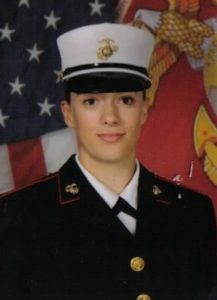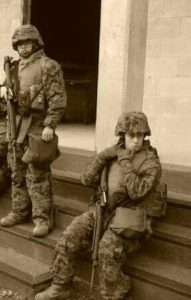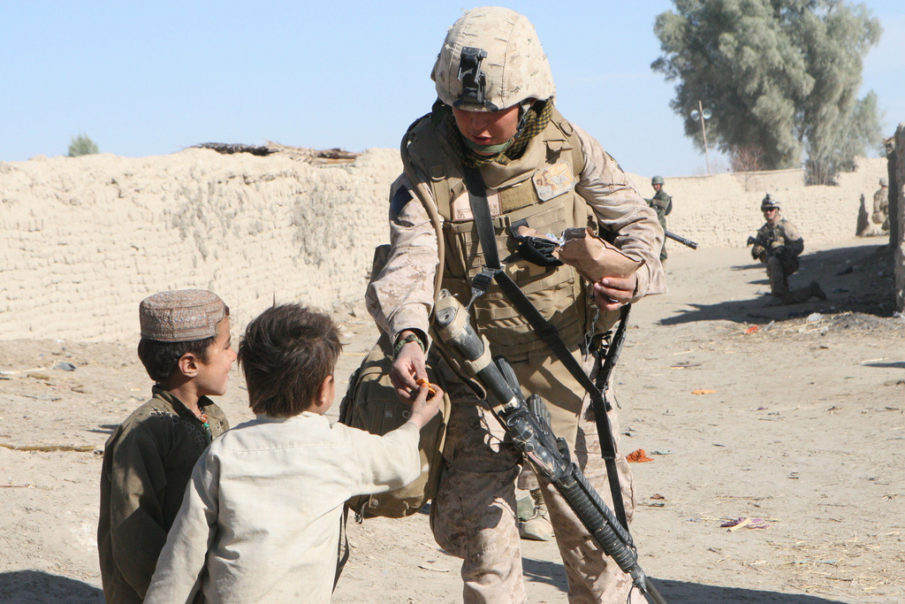- Tell us a little bit about your military background
My name is Jaclyn Imperati. I joined the Marine Corps Reserve in August 2006 as an 0612 Field Wireman with the 6th Communications battalion in New York. I was deployed to Al Taqaddum, Iraq with the 9th Communications battalion from February to August of 2008. I completed my service as a Corporal.
- Where are you attending law school, and what drew you to want to pursue it?
 I am attending Touro Law Center in Central Islip, NY. Well, I have a very strong… desire, urge, pull… to serve and protect. I have my Bachelors from St. John’s University in Homeland Security, I also have my Masters in Criminal Justice, focus on Homeland Security. My original goal was to obtain a law enforcement position within the federal government, under the DHS umbrella. I was applying and going through application processes when I obtained a job with the TSA as a screening officer. I took the job believing it would be my “foot in the door” and also increase my retirement time while I continued other avenues. While I was working for TSA, I discovered I needed a pacemaker. This has disqualified me from basically all law enforcement positions. Upon graduation, a lot of my colleagues had studied for and taken the LSAT and many were struggling. Since I am a veteran I can take many of these tests for free, so I took it as sort of a joke to see what the issue was. I did well on the exam and left it on the back burner.
I am attending Touro Law Center in Central Islip, NY. Well, I have a very strong… desire, urge, pull… to serve and protect. I have my Bachelors from St. John’s University in Homeland Security, I also have my Masters in Criminal Justice, focus on Homeland Security. My original goal was to obtain a law enforcement position within the federal government, under the DHS umbrella. I was applying and going through application processes when I obtained a job with the TSA as a screening officer. I took the job believing it would be my “foot in the door” and also increase my retirement time while I continued other avenues. While I was working for TSA, I discovered I needed a pacemaker. This has disqualified me from basically all law enforcement positions. Upon graduation, a lot of my colleagues had studied for and taken the LSAT and many were struggling. Since I am a veteran I can take many of these tests for free, so I took it as sort of a joke to see what the issue was. I did well on the exam and left it on the back burner.
Once I found out I needed the pacemaker – I applied to law schools. Finding out I needed the pacemaker and knowing my life goals were being halted came close to crushing me, but like a Marine I was too stubborn to not go down without a fight. So now, I am fighting my way through law school in hopes to be able to help law enforcement/veterans from the other side of the table.
- What were some of the biggest challenges in your transition from the Marine Corps to law school?
I don’t think I have had many challenges with the “transition” other than the mental frustration I feel when civilians complain about things that I would never dream about complaining about. Getting up for an 8 am class, have 3 classes in one day, the heavy textbooks on their backs… I think being in the Marine Corps has made my life “easier” in that way because now those little things are exactly that, little things that I don’t even think about. It’s also helps me keep my head on straight when I have to pull all-nighters to complete outlines and final projects. While this isn’t healthy behavior to do on a regular basis, I do know how to treat my body when doing these things.
- How do you feel about women in combat?
I am wholeheartedly against women in combat. I see no positive outcome of that change being made and I see no logistical reasoning for that change to be made. Women want to talk about equality, but the reality is we are not equal. Women and men are completely different. I keep seeing this image on Facebook and I really wish I could find it now and send it with this response but it is basically a bunch of skeletons and under each one it says: black, white, Hispanic, Asian, etc. The message is that we are all equal. What I find ironic is that if you put a skeleton of a female next to a male you would see – we are not the same. So we can use that analogy when it is convenient for the equality cause but when it is not convenient – the argument fails and you become a sexist pig for making that statement.
I have personally experienced combat situations. I understand the difference between being exposed to combat and actually being in a ground combat unit. Going door to door and killing any enemy combatants that you encounter is completely different from driving in a supply convoy and being exposed to an improvised explosive device or small arms fire. Witnessing dead bodies – and witnessing dead bodies that you know are dead because of your hand – have two different effects on the human mind. These are things few women have been exposed to, and should they be exposed to them, we will see catastrophic effects that the military is just not capable of handling.
- Looking back on your own time in the military, do you think things are better or worse for the women who are currently serving?
I am not sure things are better or worse today. I think, maybe, it might be a more “friendly” environment towards females, but if it is at all, it is very forced. When I was in, and from how it appears online today, women in the Marine Corps are often referred to as “mattresses” or “WM’s” which stands for women Marine but it is meant in a derogatory manner and is usually used in that negative way. “Stop being such a WM!” I guess it would be another way of saying “Stop being such a bitch.” Because of all of litigation and NJP’s that I imagine have occurred, many of the outright derogatory language has been removed. It’s not because the attitudes or thoughts have changed but the fear of being punished for using such language has been instilled. I’m sure new words are used, but they mean the same things.
Despite the animosity that I feel some men have towards women in the military, I very rarely felt it was personal when I was on active duty. Being that my unit was from NYC, we were a very close group when we deployed to Iraq. I never felt like I needed to watch my back or fear they wouldn’t take a bullet for me just as they would each other. However, I do know they felt like I shouldn’t be there. While I did the same training they did – the hard truth was it would have taken me a much longer time to be able to lift as much or run as fast as them. While I wasn’t the fastest or strongest – I also wasn’t the slowest or weakest but it never seemed to be “good enough”. While we aren’t held to same physical standards and I always made it my personal goal to remain within the male standards, I think the guys wanted me to be what they were and well, that is impossible. I am sure I am not alone in this and I do not blame the guys for feeling that way.
I know a lot of motivated female Marines. I know a current Drill Instructor, a body builder, and several personal trainers. Despite all of that – they would still be viewed in many grunt units as inferior because they wouldn’t be and never could be the strongest or fastest Marine. I don’t think this mindset has changed nor do I expect it ever will change, and most importantly – I don’t want it to change.
- Do you have any advice for service members who are looking to challenge themselves with a new career after they leave the service?
Do it! Being in the military has given service members a lot of things many civilians will never have. If you take the work ethic that was instilled in the military to a career, it will be easy.
Going to law school is the hardest thing I have ever and will ever do, but applying the Marine Corps work ethic I have has made it so much easier for me. A lot of my colleagues are shocked how energetic I am after pulling all-nighter’s, they don’t understand how I can get up at 4 am, go to work, then sit in classes until 10 pm. Rinse – Repeat. These are things that the Marine Corps has given me. Sometimes it gets hard because you don’t have a “higher up” giving you your schedule – beating it into your head that you have to be at the armory at 0-dark-thirty, but you need to bring that out of yourself. Create your schedule, stick to it, and remember the training you’ve received.
Already have an account? Sign In
Two ways to continue to read this article.
Subscribe
$1.99
every 4 weeks
- Unlimited access to all articles
- Support independent journalism
- Ad-free reading experience
Subscribe Now
Recurring Monthly. Cancel Anytime.


COMMENTS